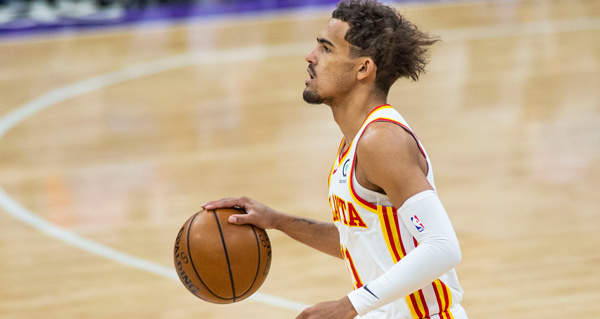Don’t look now, but the Atlanta Hawks have won two straight games. It’s a tiny, unremarkable sliver of success after a disastrous start to the 21-22 NBA season—they are now just 6-9 in this year’s campaign, following their appearance in the Eastern Conference Finals. Call it a hangover, if you will, but they have definitely been victims of one of the hardest schedules in the league so far--the Utah Jazz twice, the Golden State Warriors, the Phoenix Suns, the Denver Nuggets, the Brooklyn Nets; six homes to nine on the road. They have also been subject, as many have noted, to the limits of being too impressed with themselves.
“I’m not going to lie,” Trae Young said, after one of their bad losses to Utah. “[The regular season] is a lot more boring than the playoffs.” The 23-year-old point guard caught criticism for his honest remark, and for suggesting that he and his team believe they have already proved themselves to be above the humdrum hoops that every team must endure, every winter. And perhaps the Hawks could have sleep-walked their way to the postseason in any number of the Eastern Conference’s more recent iterations. The playoff bracket on this side of things has been open for teams with sub-.500 records for a few too many modern years.
This season appears to be different, though, as the NBA’s new play-in format has introduced a fatter middle class, with much more competition for the prize of ending up toward the middle of things. The Hawks are 12th best in the East right now, with a negative point differential. And while it’s still early enough for them to fight past their bad standing with one or two good winning streaks, it’s also clear that a philosophical shift will be required to get through the next 67 games and enter the Spring in a position to be anything better than canon fodder.
As always, there are hard basketball truths at the root of these airier sounding realities. While Young, John Collins, Clint Capela, and Bogdan Bogdanovic are surely at the core of what they’re doing, their supplementary players are largely at a crossroads. When Atlanta went for broke to microwave a contender around Young in the summer of 2019, it involved adding Danilo Galinari and Rajon Rondo--who later become Lou Williams, via trade. Williams and Galinari, 35 and 33 years old respectively, have both been pretty crappy to start the season; both are shooting at or near career lows from the field, and anyone familiar with either veteran knows they’re probably causing you far more problems than solutions if they aren’t scoring efficiently.
Meanwhile, 22-year-old Cam Reddish is adrift in his own way. The wingman missed most of last season injured, and became healthy for the team’s playoff run just as Young suffered a season-ending bone bruise that turned the Eastern Conference Finals into a stretch of glorified exhibition contests. One could forgive Reddish for not yet feeling a part of the Hawks’ collective identity. With De’Andre Hunter set to miss extended time with a wrist injury, though, Reddish could see his minutes trickle back up to where they were before he got hurt last year, and before his team took off without him.
The popular interpretation of what’s wrong with the Hawks is of course centered around Young. One of the main characters in the narrative built from the league’s rule changes, Trae’s free throw attempts per game are noticeably down. His overall scoring and distribution remain the same, however, with his efficiency heading just a tick upwards. In other words: despite being openly bored, he has remained excellent. What his team needs from him now, though, is a demonstration of problem-solving and leadership of a more advanced kind; in collaboration with head coach Nate McMillan, the Hawks’ young heliocentric nexus needs to rearrange the pieces around him, and set the tone for everyone else by finding thrills in the mundane and the detail-oriented.
This is the Chris Paul level of things. Can Young be the kind of guy who best blends the experience and development around him, through shrewd night-to-night understanding of match-ups and circumstances? Can he instill a team-wide vibe? That is exactly who he looked to be in last year’s playoffs, as the Hawks toppled the New York Knicks and then pillaged the Philadelphia 76ers through seven mostly ugly games. The strategic lines kept shifting on Young—the more experienced Sixers threw different defensive looks at him, most of them very rough, but he kept showing his team the way past them, even while he was terribly inefficient.
He is back in that kind of mud now; the Hawks are “no longer the hunters,” as he said. Everyone in the league watched their unlikely run last postseason, and everyone now has more of a working idea of how to deal with them. The problem-solving standard has shifted permanently upwards for Atlanta, because now everyone is much more motivated to be their problem. And they will have to decode hardwood riddles over several dozen games instead of just a series or two. A team that appeared to quite suddenly come of age still, it turns out, has a lot of growing up left to do. Whether they can do it or not will be one of the greater curiosities of the ongoing season.



